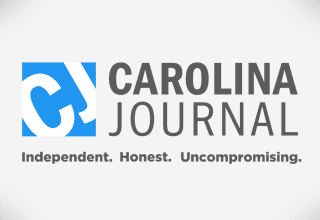On Tuesday, Gov. Josh Stein signed six bills into law, including one that limits students’ cell phone use in the classroom.
HB 959, Protecting Students in a Digital Age, would require school boards to adopt policies prohibiting students’ access to social-media platforms in the classroom “except when expressly directed by a teacher solely for educational purposes.”
It would also ban TikTok on devices owned by school districts or through internet access provided by the school district. The measure additionally integrates lessons into existing health and mental-health curricula to educate students on the dangers of excessive social-media use.
“This is really an effort to further address what I think is generally recognized as the issue of social media and the negative impacts that they can have, both educationally and mentally and emotionally on our children,” said state Rep. Hugh Blackwell, R-Burke, the bill’s primary sponsor, during a House K-12 Education Committee meeting.
Stein, a Democrat, also signed HB 67, Healthcare Workforce Reforms, which strengthens access to health care and provides a streamlined process that allows physicians to become licensed in multiple states.
Rep. Grant Campbell, R-Cabarrus, a physician, said on X that the bill would address the state’s physician/PA shortage and help meet workforce needs in mental health/addiction care.
Charlotte Mayor Vi Lyles thanked the governor on X for signing HB 948, the PAVE Act, into law.
The legislation, titled the Projects for Advancing Vehicle Infrastructure Enhancements (PAVE) Act, would authorize Mecklenburg County commissioners to place a 1% local sales tax on the ballot this November.
If approved by voters, the measure would fund a range of transportation projects, including road improvements, bus systems, and rail development.
“I want to thank @NC Governor for signing the PAVE Act this morning and recognize everyone who helped us move this legislation forward,” Lyles said on X. “This is a great example of how local and state leaders can work together, across the aisle to get something done. We still have more work to do, but this is a milestone moment for Charlotte and Mecklenburg County – one that we have been working towards for many, many years to create a better quality of life for our residents.”
Under the plan, 40% of the sales tax revenue would be allocated for road planning needs in the county’s six towns — Cornelius, Davidson, Huntersville, Pineville, the City of Charlotte, Mint Hill, and Matthews. An additional 40% would be spent on rail projects, and the remaining 20% would be spent on the bus program.
The bill creates a new 27-member transit authority to oversee how the transportation money is spent. It will include members appointed by the governor, state lawmakers, Mecklenburg County, and local towns and cities. No elected officials or lobbyists can serve on the board. The group will focus on big projects like rail lines and bus service, and it must finish at least half of the Red Line rail project before starting any new rail lines.
HB 412, Child Care Regulatory Reforms, was also signed into law. Supporters have said that it would address affordability and access issues for families while reducing operational burdens on childcare providers.
At the heart of the legislation is the proposal to decouple the state’s Quality Rating Improvement System, or QRIS, from childcare subsidy reimbursement payments. Under the current model, childcare facilities’ star ratings directly affect the reimbursement rates they qualify for.
The bill requires the Department of Health and Human Services to develop a plan for the QRIS decoupling by May 1, 2026. Additionally, DHHS has been directed to conduct a market rate study to establish new reimbursement rates, pending approval from the state General Assembly.
Beyond the QRIS reforms, HB 412 would continue child-care stabilization grades and implement new deregulation aimed at reducing costs for providers. Notably, the bill streamlines standards for workforce qualifications and facility operations, including by addressing definitions for lead teachers, staff-child ratios, and space and equipment requirements.
One significant change would bring religious childcare facilities — which currently operate under separate requirements — into alignment with other licensed providers regarding subsidy payments and quality expectations. Proponents argue that expanding the pool of providers receiving state subsidies will ultimately increase accessible childcare options for families in need.
Stein also signed SB 124, State Hiring Accessibility and Modernization; and SB 321, Accounting Workforce Development Act, into law.
The post Stein signs 6 bills, including limiting student cell phone use first appeared on Carolina Journal.
The post Stein signs 6 bills, including limiting student cell phone use appeared first on First In Freedom Daily.
Click this link for the original source of this article.
Author: Theresa Opeka
This content is courtesy of, and owned and copyrighted by, https://firstinfreedomdaily.com and its author. This content is made available by use of the public RSS feed offered by the host site and is used for educational purposes only. If you are the author or represent the host site and would like this content removed now and in the future, please contact USSANews.com using the email address in the Contact page found in the website menu.








